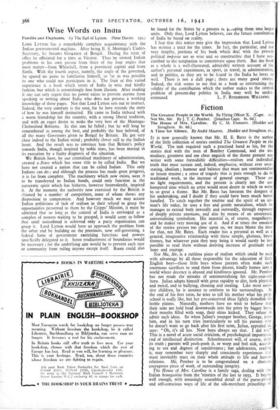Wise Words on India
Pundits and Elephants. By The Earl of Lytton. (Peter Davies. 15s.) LORD LrrroN has a remarkably complete acquaintance with the Indian governmental machine. After being E. S. Montagu's Under- Secretary, hc became Governor of Bengal. During his term of office he officiated for a time as Viceroy. Thus he viewed Indian problems in his own person from three of the four angles that most matter—from Whitehall, from a provincial capital and from Simla. With the fourth aspect, namely, the angle of the governed, he spared no pains to familiarise himself, so far as was possible to one who could not participate in it. The fruit of this varied experience is a book which treats of India in wise and kindly fashion. but which is astonishingly free from illusion. After reading it one can only regret that no power exists to prevent anyone from speaking or writing about India who does not possess a working knowledge of these pages. Not that Lord Lytton sets out to instruct. Indeed, the very contrary is the case, for he here records the story of how he was himself instructed. He came to India imbued with a warm friendship for the country, with a strong liberal tradition, and with an eager, desire to make the very best of the Montagu- Chelmsford Reforms. In this aim he failed ; but he will long be remembered as among the best, and probably the best beloved, of all the many Governors given to Bengal by Britain. He got very close indeed to the Indian mind ; probably closer still to the Indian heart. And the result was to convince him that Britain's policy towards India, though inspired by noble aims, has been marred in its execution by a faulty diagnosis of the situation. We British have, by our centralised machinery of administration, created a.State which has some title to be called India. But we have not created a nation that can be called Indian. This only Indians can do ; and although the process has made great progress, it is far from complete. The machinery which now exists, were it to be transferred to Indian hands, could only function in the autocratic spirit which has hitherto, however benevolently, inspired it. At the moment the authority now exercised by the British is claimed by a number of competitors, none of whom shows any disposition to compromise. And however much we may accuse Indian politicians of lack of realism in their refusal to grasp the opportunities presented to them by the Cripps' Mission, it must be admitted that so long as the control of India is envisaged as a complex of powers waiting to be grasped, it would seem to follow that until nationhood is achieved only a party organisation can grasp it. Lord Lytton would have us approach the problem from the other end by building on the provinces, now self-governing, a federal form of government exercising functions and powers specifically delegated to it. Some readjustment of boundaries would be necessary ; for the underlying aim would be to prevent each race or community from ruling anyone except itself. Room could also
be found for the States by a process ot g.-uping them into larger units. Only thus Lord Lytton believes, can the future constitution of India be base on reality.
I fear that this notice may give the impression that Lord Lytton has written a tract for the times. In fact, the particular, and not very lengthy, portions of his book which deal with the present political impasse are so wise and so constructive that I have suc- cumbed to the temptation to concentrate upon them. But the book as a whole is a well-illustrated, admirably written account of the author's personal experiences, in sport, in travel, in administration, and in politics, as they are to be fcund in the India he loves so well. There is not a dull page ; there are many good stories. Indeed, the risk seems to me that in a book so entertaining the solidity of the contribution which the author makes to the central problem of present-day politics in India may well be under-


























 Previous page
Previous page